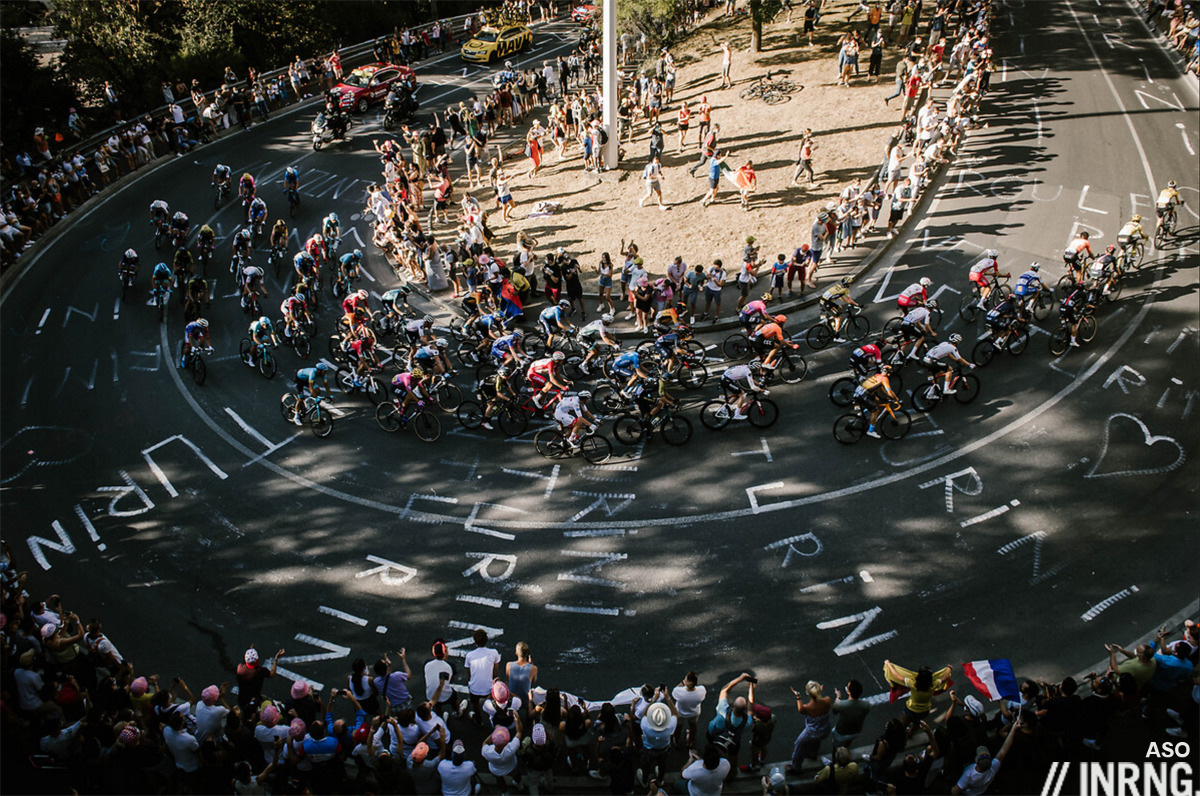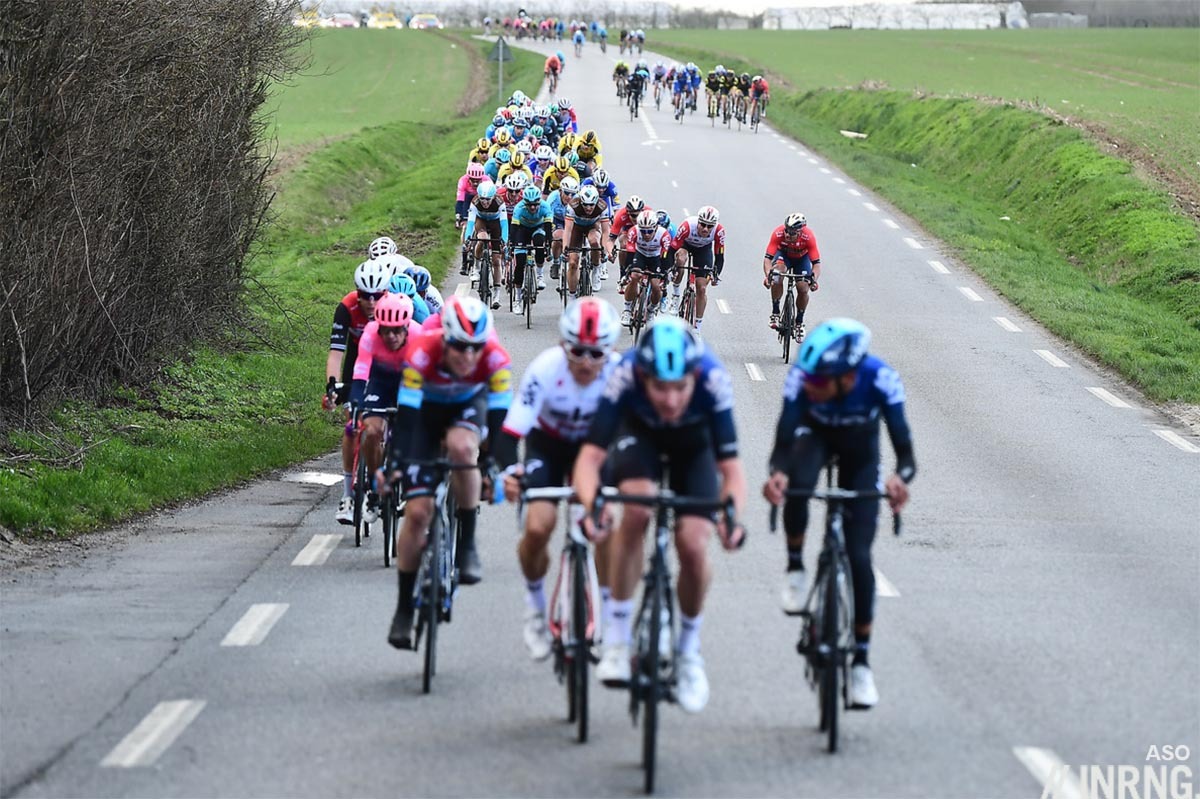
A small digression into language inspired by today’s so-called “Queen Stage” of the Tour de France. There are many French words that are used in English coverage of the sport, terms like maillot jaune, flamme rouge or rouleur usually don’t require translation. But there are a few French words that are “false friends”, they’re French words used in English but not used in French coverage of the sport.
Queen stage? Today’s stage of the Tour is neither the longest nor the most mountainous but it still features a lot of climbing. However where does the term come from? It’s a literal translation, perhaps too much so. In French all nouns have either a male or female gender, like le vélo (masculine) or la bicyclette (feminine) and a stage is une étape which is feminine which means the accompanying regal adjective adopts the feminine to become étape reine, literally the Queen stage but in English you could easily say the “king stage” or the “royal stage”. Or étape royale if you feel like Vincent Vega.

Another commonly used French word in cycling is echelon to describe the groups that form in crosswinds. Only it’s not the term used in French, that’s a bordure. This is literally the edge or border of the road and gets the name because of the diagonal formation of riders across the road is defined by the edge of the road, it’s the last place of shelter in the line and so the rider behind has to open a new bordure or risk floundering.

A quick term is bidon for water bottle, used interchangeably in English and French within the peloton. But outside the sport for many in France it’s une gourde, ride up a mountain and children will beg “une gourde, une gourde” rather than a bidon.
A kermesse is often used in English to describe a Belgian bike race, a circuit race with semi-professional riders with relentless attacks and hidden alliances. But in French a kermesse is derived from the Dutch kerkmisse or “church mess” but has come to mean a village festival and it often happens that a Belgian village stages a bike race as part of the festivities.
The peloton means the bunch but in French it has a wider meaning, it’s literally a platoon and one of several martial terms used in the sport.

The English term for a team mate who works for others is a domestique, a French word. But in French it’s an équipier. There’s a story to this as in 1911 the Italian cyclist Maurice Brocco was having another bad Tour de France and instead of just riding by himself to finish the stage each day, he decided to sell his services to another rider, in this case Luxembourg’s François Faber: he’d work for Faber in exchange for money. This outraged the Tour director, the stern Henri Desgrange and he used his newspaper column in L’Auto to blast Brocco as “undeserving” and a mere domestique but with this word he meant a servant, as in someone who was paid a meagre wage to perform household chores. It was meant as a term of abuse but today, in English at least, it denotes self-sacrifice and team spirit.

Thanks for this fun post! Nice topic indeed.
Two words:
– I’ve always heard the word “bidon” for water bottle, including in clubs… I’d use “gourde” for the ones you take hiking, or maybe those camelback pouches in backpacks. Might depend on the region.
– “Echelon” (Fr: “ladder step”) would be used to refer to the groups (premier échelon, deuxieme échelon, etc) in a “bordure” (the configuration of the race). The act, or tactic, would be a “coup de bordure”.
The “king of the mountains” could also be a false friend, since in France he’s not “king” of anything – probably a good thing, considering our tendency to lop their heads off.
The classification would be called “grand prix de la montagne” (Mountain GP) and a KOM sprint, by metonymy, is a “grimpeur”.
One thing to note with the mountains competition is that the Tour website now refers to it as “meilleur grimpeur” as in best climber, but the green jersey competition is still the points classification rather “meilleur sprinteur”.
Is that because they once had the metric system and now they want to go back to pounds and guineas?
I laffed so heartily at the Vincent Vega anecdote(?)
Why would anyone want to do that?
Echelon has a meaning in English beyond cycling. It is “a formation of troops, ships, aircraft, or vehicles in parallel rows with the end of each row projecting further than the one in front.” that seems a pretty apt description for what happens in a cycling race when the wind blows. It can have other military meanings too such as “rear echelon”. Apparently its origins are in the Latin word “scala” meaning ladder which became the archaic French word “échelle” which became “echelon” and into English military terminology during the Napoleonic wars.
As you seem to be a bit of a geek, one can dig a bit more on peloton, which means “petite pelote”. A pelote is a ball of string, or wool, or an old word for a playing ball (eg, pelote basque, or jai alai). You can have your “nerfs en pelote”, be a nervous wreck.
Figuratively peloton can designate a closely knit group of people, such as a military platoon, or a bunch of cyclists. (frankly I never considered the military connotation when it’s used for cyclists)
On échelon: as Lukyluk wrote above, échelon is the diagonal line of riders across the road. Bordure is what happens when there is no more space downwind, and riders line up along the edge of the road (bord = edge, bordure = edge effect), and lose the benefit of drafting. This will cause a break, and the creation of a 2nd échelon.
To jc, échelle is the ladder, and échelon is a single step on the ladder. So échelon can be used any time things break into steps. Eg to pay for something in installments, it’s “échelonner les paiements”. So the military rear echelon would be the last group of soldiers.
My many hours ( and € 000) spent in Mr. Bricolage have taught me that they sell two sorts of ‘ladders’ : echelle which are straight ladders, and escabeau, which are stepladders in two or three hinged parts.
So the ‘steps’ of an echelle should properly be translated as ‘ rungs’.
That was fun.
As an appreciator of the french language (I actually have an obscure french English dictionary called “false friends” on my book shelf listing may many more of the things) I loved this. One question: I could quite read where on the delightful scan the articule was – I’ve heard of it before and would love to read it!
Could in the last sentance should be couldn’t!!
Here you go: https://gallica.bnf.fr/ark:/12148/bpt6k4630566j/f1.highres
This link worked slightly better, d didn’t know about garlics until now!
https://gallica.bnf.fr/ark:/12148/bpt6k4630566j/f1.item.zoom
If I read it right, in the text, Desgrange claims that the term “domestique” was used by the other riders as Brocco’s nickname because he was showing off so much about the money he had made by selling his towing service…
Desgrange wanted to throw him off the race – he saw the Tour as test of individual human efforts – but couldn’t find a rule to do it, how to prove Brocco had sat up? Stung by the insult Brocco decided to prove what he was capable of and won a stage of the race… only to get disqualified by Desgranges who reasoned that if Brocco was capable of winning a stage then his prior act of helping another rider was clearly beneath him.
Interesting read! I always thought ‘kermesse’ was derived from the Dutch (/Flamish) ‘kermis’. A ‘kermis’ is a fair and during such a fair sometimes bike races are organised.
Agree, de dutch name for a kermesse is actually ‘kermiskoers’ witch would translate to ‘village fair race’ or something along those lines.
Both share the same links and yes, it goes back to the village festival. The Tour de France sits at the top of the pyramid, an U-14 race with 80 laps of the church square during a village festival is the stereotype of the base in France, Belgium, Italy etc.
Id always thought the Ker_ comes from the breton for place..? The village fete in Brittany is .
‘Ker est un appellatif toponymique breton utilisé le plus souvent comme premier élément d’un toponyme. Il désigne un lieu habité.’
Of course it could just be convergent etymological evolution, thus making everyone happy they think they know its true meaning, and so the coinage sticks.
Village fete in breton is ‘kermesse’, but you can also have one at a house, on a farm or in an old folks home.
.sorry to leave you hanging.
A ‘kermis’ or Kirmes, as we say in German (depending on which part of the country, may also be Kerb or Kerwe), is derived from the anniversary of the foundation of a church (church-mass). Traditionally this day is celebrated with a fair. And later bike races became part of this fairs.
So we call a local Criterium Kirmesrennen or Kerberenne, even if it is not on the anniversary day or has a church involved.
Always bothered me that “domestique” has such a pejorative aspect. Interesting to know that it’s from the almighty Desgrange, and that the disparagement was intentional. Inrng reassures that the term has meliorated for English speakers so I’ll take his word.
Presumably Desgrange had one or several domestiques at his home?
Nice to think he thought so highly of them? Toss pot.
My inner word geek is swooning over this column and discussion.
Another use of “echelon” in English: the word for the formation a flock of geese (or other large migratory birds) make when flying long distance, typically with one at the front, then two offset behind, and one behind each of those, also offset so as to form an aerodynamic V-shape or arrow. The birds rotate the “leader”.
Intriguing headline in that paper, Allo! Allo! — sounds like a good name for a dodgy 80s UK comedy series
Another false French friend mentioned on the cycling podcast is autobus as an alternative to grupetto, except the French don’t use the term, preferring the Italian.
Yes, it seems autobus used to be the term but it’s switched, maybe down to the more international peloton.
I think inside the peloton ‘grupetto’ is also the word used most often. It least I would gather that from post-race interviews with guys rolling over the line long after the winner.
whichever language you use I think we can all agree that an étape royale is a very tasty treat….especially when served with beer in a glass….
I wonder whether Italian gregario developed as a calque of domestique as it expresses the same analogy with a house servant.
Another misnomer you may temped to use when speaking to a French person is talking about ‘Bastille Day’. It’s not referred to as such by native French, they prefer ‘national day’ or ‘national holiday’.
“Or étape royale if you feel like Vincent Vega.” Wonderful.
Kongeetappe in Norwegian. Maybe because we have no tradition for female regents.
Pardon. That was me.